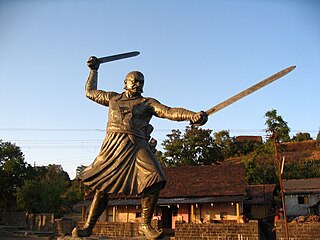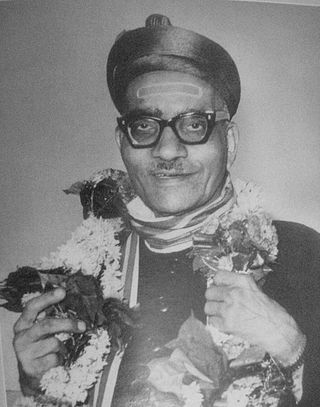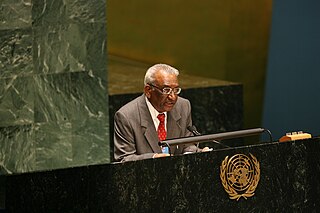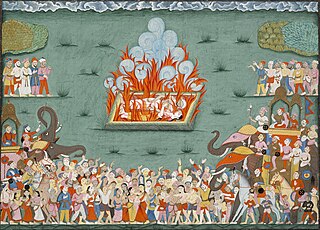
The Peasants and Workers Party of India (PWP) is a Marxist political party in Maharashtra, India. The party was founded in 1948, having its roots from the pre-Independence period and has around 10,000 members. The influence of the party is largely limited to three districts. The party was founded in Maharashtra by Keshavrao Jedhe of Pune, Shankarrao More, Bhausaheb Raut of Mumbai, Nana Patil of Satara, Tulshidas Jadhav of Solapur, Dajiba Desai of Belgaum, Madhavrao Bagal of Kolhapur, P K Bhapkar and Datta Deshmukh of Ahmednagar, Vithalrao Hande and others.

Madhavrao I was the son of Peshwa Balaji Bajirao and grandson of Peshwa Bajirao I who served as 9th Peshwa of the Maratha Confederacy. During his tenure, the Maratha Confederacy recovered from the losses they suffered during the Third Battle of Panipat, an event known as Maratha Resurrection.

Kolhapur district is a district in the Maharashtra state of India. The city of Kolhapur is its district headquarter. It is situated near Panchaganga river.
Peth Vadgaon is a city and education hub in Kolhapur district in the Indian state of Maharashtra. It is governed by a municipal council.
Madhukar Vasudev Dhond was a literary and art critic from Maharashtra, India.

Dattatray Vaman Potdar, better known as Datto Vaman Potdar, was an Indian historian, writer, and orator. He was the Vice-Chancellor of University of Pune during 1961 - 1964.
Setumadhavarao Pagdi or Sethu Madhav Rao Pagdi was an Indian civil servant, a polyglot linguist, an accomplished historian and a distinguished man of letters specialised in modern Maratha history, especially the history of Shivaji. He also worked as the secretary of Government of Maharashtra. As a secretary he did his job fairly well. Setu Madhavrao was well versed in Marathi, English, Hindi, Sanskrit, Urdu and Persian, apart from Kannada, which was his mother tongue. As a linguist he discovered the sound system and Grammars of tribal languages like Kolami and Gondi. He was one who served the cause of Marathi against all odds in pre and post - Independent Hyderabad state. Following in the footsteps of the noted Bengali historian Jadunath Sarkar, Setu Madhavrao wrote Shivaji's biography in Marathi and English and the theory enkindled the spirit of nationalism in his readers.

Rang Rasiya, titled Colours of Passion in English, is a 2014 Indian drama film written and directed by Ketan Mehta, based on the life of the 19th century Indian painter Raja Ravi Varma. It was released bilingually in Hindi as Rang Rasiya and in English as Colours of Passion. The film was a cinematic adaptation of the novel Raja Ravi Varma by Ranjit Desai. It stars Randeep Hooda as Raja Ravi Varma and Nandana Sen as his love interest.
Ravindra Laxman Mankani is an Indian actor who is noted for his work in soap operas, plays and films. He first became a civil engineer and then shifted to acting. He is currently playing the lead role of Dadasaheb in Zee Yuva show BaapManus.
Ranjit Ramchandra Desai was an Indian Marathi-language writer from Maharashtra, India. He is best known for his historical novels Swami and Shrimanta Yogi. He was awarded the Sahitya Akademi Award in 1964 and the Padma Shri in 1973.

Dr. Janardan Madhavrao Waghmare is an Indian politician and educationist. He has served as a Member of Parliament in the Rajya Sabha from Maharashtra. He was also the President of the Latur Municipal Council.

Ramabai was the wife of Madhavrao Peshwa I. Her father's name was Shivaji Ballal Joshi from Solapur.

The following list includes a brief about the titles of nobility or orders of chivalry used by the Marathas of India and by the Marathis/Konkanis in general.
Swami Anand was a monk, a Gandhian activist and a Gujarati writer from India. He was the manager of Gandhi's publications such as Navajivan and Young India and inspired Gandhi to write his autobiography, The Story of My Experiments with Truth. He wrote sketches, memoir, biographies, philosophy, travelogues and translated some works.

Tulsidas Borkar was an Indian composer and harmonium player. The Government of India awarded him the civilian honour of the Padma Shri in 2016.
Madhavrao Khanderao Bagal, also called Bhai Madhavrao Bagal, was a noted writer, artist, journalist, social reformer, political activist, orator and freedom fighter from Kolhapur.

Ali Bahadur (1758–1802), also known as Krishna Sinha, was a Nawab of the dominion of Banda in northern India, a vassal of the Maratha Empire. He was the son of Shamsher Bahadur I and the grandson of Peshwa Bajirao I.
The Bhatt Peshwa family earlier known as Bhat family is a prominent Indian Chitpavan Brahmin family who dominated India for around 100 years in the late 18th century and early 19th century. Most of the members in this family were the Peshwas in the Peshwa era of the Maratha Confederacy, and Peshwa later became their family name. During their regime, most of the Indian subcontinent was under their control. The last Peshwa, Baji Rao II, was defeated by the British East India Company in the Third Anglo-Maratha War in 1818. The territory was annexed to the British East India Company's Bombay Presidency, and he was pensioned.
Honaji Sayaji Shilarkhane (1754–1844), known professionally as Honaji Bala, was a Marathi poet from Maharashtra, India. Honaji's compositions were sung by his friend Bala Karanjikar, and together the pair was known for their "Honaji Balacha Tamasha". He is known for contributions to the field of Lavani music and several classical Marathi song.

Siddeshwar Swami was an Indian spiritual preacher and philosopher known for his teachings on yoga and spirituality. Swami was the head of Jnanayogashrama, an ashram in the city of Vijayapura, in the Indian state of Karnataka. He declined the Padma Shri, India's fourth-highest civilian award, when it was awarded to him in 2018. He had earlier declined an honorary doctorate from the Karnatak University.










